#i've been taking it for granted this entire time not realizing how many different contexts it's used in
Text
"why does this word mean multiple things in this language" vs. "why can't i use this word for all these different contexts it's so much more simple that way"
#me @ the word “at” in english#i've been taking it for granted this entire time not realizing how many different contexts it's used in#vs german where there's like. 5#um in im zu bei#probably more#not faulting german for this but damn i thought 'at' was simple#random rambling#german#deutsch#learning german#learning languages#language learning#linguistics#language#languages#langblr#language memes#linguistics memes#english language#german language
242 notes
·
View notes
Text
loook i get why the idea of riding the "anti/pro" fandom disk horse makes people gag a little in their mouth and try to opt out entirely, but here's why i went from feeling exactly the same way to taking a firm profiction stance. I've been meaning to make this post for a while.
~10 years ago, I posted a fic for the first time and it got its own harassment campaign. The fic wasn't even sexual, and wasn't going to be (it remains incomplete). It was accurately rated T on fanfiction.net. Anyone in the Fairy Tail fandom will understand this: I literally got harassed for writing a "Lucy leaves the guild" fic💀.
After many nice comments, someone left a pretty nasty one. Hurt, I messaged them back. They acted super attacked that I'd responded (lmao) and after we argued, threatened to "rip my shitty story apart in the comments section" if I responded again. I told them "go ahead lol."
They went ahead.
Now know that it was a relatively small harassment campaign, but at the time, it was devastating. Right around then, I wound up in the hospital. After I got out, I went to excitedly check my fic, and found several reviews saying things I wouldn't repeat to my worst enemy. I was suicide-baited more than once, told "thank fuck you finally abandoned this shitty story, dumb cunt," stuff like that.
There were several accounts involved, and I can't say for sure, but I suspect at least a couple different people were involved, though probably at least half of it was one person.
All the other comments were screeching about how I hadn't updated, mostly. "NO UPDAAATEE WHY DOES THIS ALWAYS HAPPENS TO MEEEE??!!!" was one that stood out after I'd been miserable in a hospital for an extended period of time.
Idk what people think is going on when FT fic authors write this trope, and frankly I don't give a fuck. Because while I was partly writing the story out of some young, cringe feminist rage, I also did genuinely have a real story I was compelled to tell. I was inspired by another, popular fic I loved which used the trope to talk about how trying to shoulder our burdens alone really just hurts both ourselves and everyone who cares about us.
My own story was ultimately going to have similar themes, with more focus on strength, what it means, and in what contexts earning and having it actually matters. In retrospect, no wonder I wound up in hot water, because at the time "Lucy vs. Strength vs. Misogyny" was the FT fandom's Designated Nonsensically Activist Debate™. But that's partly why i wanted to write about it; engaging with the fandom had gotten me thinking about it 🤷♂️
Not too long after that, FFNet oh-so-benevolently granted us the ability to delete comments from our own stories (they never took my reports seriously at all, afaik). I deleted all or most of the harassers' comments (may still be a one or two up, and i'm fairly sure there's a couple comments defending my fic from the harassment) without saving screenshots, which I really regret now. I was just so mortified and full of self-loathing about the whole thing that i wanted to forget it completely. Something that had brought me joy at a very lonely, vulnerable period of my life had turned so negative, and i couldn't even tell the people closest to me about it without being made fun of for writing anime fan fiction.
I didn't understand why this happened at the time, but--after a period of trying to forget/bid out of it all with a slight anti lean (a common approach I see people use, and one which I'm not proud of adopting)--I just had to figure out What the Fuck Even Happened There. And I'm telling you, after years of reflecting, wrestling with both sides, and educating myself, that this "status quo of harassment" culture which pervades fandom goes way deeper than you think and comes out of a way darker well than you probably realize. An astonishing amount of this is, quite literally, TERF shit and evangelical shit.
Trying to be in fandom and take a stance of, "Anti/Pro shit? Ew, I'm Not Touching that," is like swimming in a heavily polluted river and being like, "Poison? Cringe. Not me lol."
You might be lucky enough to be in a less-polluted part of the river (AKA a relatively non-toxic fandom, in which case good for you!)...but tbh this rhetoric and peer-signalling will still seep in.
I can't stress enough that pro-fiction, AKA "proship", is the normal, leftist-about-art-and-sex opinion. Pro-ship is against all the horrible things you're against; in fact, pro-ship isn't trivializing real trauma by equating it with fictional trauma, or trying to apply literal evangelical/radfem solutions--which are proven not to prevent or help. Profiction/proship is literally just saying, "Fiction is fiction, reality is reality, and the two don't have a 1:1 relationship. And historically, trying to censor just things we've decided are bad has done nothing but get LGBTQ+ and POCs censored. Therefore, depictions of illegal things shouldn't be censored." That's it. "Proshippers all ship problematic ships," is a brazen lie. Many of them share other fans' disgust for those ships, they just don't believe in censoring fic authors over it.
It is also taking a stand against harassment because--and I hope my own story has helped drive this home--as with all groups who adopt ingroup/outgroup thinking, antis are defined by their tactics, not actual stances on real, serious issues. What happened to me was absolutely a result of anti, "it's okay to 'bully out' anything I just don't like" mindset pervading fandom. In a way, this was the mindset's final form. They didn't even feel the need to cite a reason the trope was "bad" or "wrong"; it annoyed them, and they viewed their own feelings as a valid enough pathway for policing to go right ahead and do so.
In the interest of offering solutions instead of just bitching about problems, I might make a "how to know if you've bought into these types of views"-type post sometime. Also might come back to this and provide some sources/citation.
#cw harassment#tw suicide-baiting#tw hospitalization#posts i actually wrote#fairy tail#nalu#fandom#fandom meta#proship#pro fiction#anti-censorship
129 notes
·
View notes
Note
Continuing on that observation because I forgot to add this part, as a gen z I'm glad you understand that we or young people don't invent new ways to be evil, but it's not completely true. You aren't seeing new forms of online abuse in every platform, I doubt second hand information is going into details as well. Also the fact that you are a white man, there are things being said and done to poc in various online communities that I don't expect you to be privy to. Harassing fans of color and poc media has become a lot more common and normalized which parts of the fandom at large will never see. I don't know if anon did all of the thinking before saying "gen z bad" but they're not completely wrong looking at the kind of mass bullying behavior literal kids are exhibiting. They are learning from or being encouraged by older people but that shouldn't take the focus away from them to blame only the older people.
And my ask regarding Barbara, you assumed I hadn't thought about if my disdain for the character could have come from ableism. I had tho, granted you couldn't have known that and it was surely a possibility, so I'm not saying I'm mad about it, I was at that time a little bit. But you could perhaps give your anons a little more credit sometimes. Sometimes people know what they're talking about, you don't need to explain other possibilities to them each time.
Once again, sorry if this came off as very rude I just needed to share that observation and among many other instances these two were really highlights and kept bothering me. My issue with Barbara goes in a different direction than anything to do with her appearance and I've personally faced online abuse from people younger than me in ways that technologically, even politically, wasn't possible or as easy a few years ago, so you can maybe see why...
Please keep in mind that whatever context you have for yourself or your ask when you come into my inbox on anon......I have none of that. You have an awareness of yourself relative to whatever you asked me. I literally only know an anon by the words they put into my inbox and nothing else.
Also please keep in mind that every anon I answer, I do so in the larger context of my own interactions with tumblr overall. I have a lot of precedent with things I say being taken out of context, misrepresented or even just me not conveying myself as well as I like.
So the combination of those two things is that a) I literally just don't KNOW what any anon does or doesn't know and b) If I'm going to answer an anon, I tend to want to answer as fully and clearly as possible.
I can understand it coming across as being talked down to, so I'll work on that, but I would ask people to remember the above and keep that in context too when weighing my responses.....am I actually being condescending in every case, or does it simply feel that way because I'm including stuff you already know in my response? And if its the latter, is THAT something I COULD know about you without knowing who you are or you as a person and not just a paragraph sent in anonymously?
I'd rather be safe than sorry, and so from my POV since there's no harm in somebody seeing someone cover information they already know as PART of their overall answer or response, like, there's no reason for me not to include whatever I think is relevant and just expect readers to decide for themselves what about my response, if anything, is helpful, and like....just ignore the rest, y'know?
Also, just for the record, I am ADHD and I save my medication for when I'm working or writing or have stuff I absolutely need to get done, which doesn't include my usual blogging. So I'm usually posting while not on my ADHD meds at all, hence the rambling tendencies and the length. Another aspect of ADHD that doesn't get talked about much ime is we tend to over-explain, part out of just excitement/interest in whatever it is that has our attention, and also in part because we're used to people not necessarily following the leaps our minds take when jumping around rather than proceeding in an orderly thought pattern.....so, part of why I break things down so incrementally is I literally just don't know where my way of looking at things diverges from the way neurotypical thinking views things, so I want to draw as detailed a map as possible in order to ensure the most people possible can follow my thought process, just in case.
(And again see, this is something you might already know, and hell, you could have ADHD yourself, I just literally have no way of knowing that so rather than just mention it and be like "oh and also I have ADHD and so that's something to keep in mind" I'd rather explain WHY I feel that's particularly relevant to your question, since I'm kinda like, why not answer as fully as I have the spoons for? People can stop reading at any time if I go on too long. Its fine).
As for the specific asks you're referencing - my response to the gen z anon was not meant to convey that the sort of things you're describing don't occur among gen z, so sorry for giving that impression. Its actually the opposite of my point, which was simply that I don't think its a generational thing, or that anything is gained by treating it as a generational thing. This kind of behavior exists in gen z, yes, but it also existed before gen z. Its not gen z SPECIFIC, or limited to just that generation. That's all.
And the other ask, the one you made about Barbara - to be honest, I don't have anyway of knowing for sure which one you meant, and there are a couple it could have been, but if its the one I THINK you're referencing, I believe you asked how to stop people from assuming you dislike Barbara for reasons rooted in ableism when its because of other things? If that's the one, then I mean, the thing is....I DID answer your question, in as much as anyone could. I addressed the perceptions other people might have of your stance there, but basically - there IS no way to ever ensure people take you at your word or any kind of guarantee you can present your POV in a way that won't be misrepresented or misunderstood. So ultimately, I just had no real useful advice for that?
And so I expanded into the only thing I think anyone CAN control, aka their own thoughts and words, and suggested that you just double check to be sure of your own possible biases that others might read into your words without you being aware you were putting them in there. That wasn't meant as an insult or to suggest you hadn't already examined yourself for possible ableism - it was simply saying it never hurts to check again, y'know? We don't always catch everything every time we do a self-review, and internal biases are inherently tricky to pick up on ourselves. And it just loops back into the fact that I really had no way to know what you had and hadn't already considered, you're essentially a blank cipher to me....and in my experience, a lot of people are a lot more ableist than they realize.
And this isn't an insult either! It applies to me and I'M physically disabled! I'm constantly to this day unpacking new realizations about how I still have more ableist views and opinions than even I realize, even after about five years of living with chronic pain, vertigo, nerve issues and associated problems stemming from only half a working mouth lol. I'm not trying to insult people by asking them to just do what I do every day and just like....make sure I'm not the problem when other people have a problem with me. Because sometimes, even after reflecting as fully and genuinely as I can, I think they're still wrong! I don't have to agree with their conclusions! But that doesn't mean that they're never right.
And for the record, I do think its still worth examining on your end, because I don't love that you said your issues with Barbara have nothing to do with her appearance, when we're talking about ableism specifically. It very well could be just a poor word choice on your part and not a reflection of your actual views, but it could also be a suggestion that you tend to think of physical disability as something that's limited to there being a visual sign of, and there's a lot of invisible symptoms and changes to the ways a disabled person interacts with society and society with them that don't alter a disabled person's appearance in anyway...and many of these things are the exact stuff a lot of unacknowledged ableism revolves around.
So I'd like to give you and other anons more credit and the benefit of the doubt and assume you know what you're talking about and don't need things broken down as much as I tend to break them down to - but keep in mind I don't OWE you that, and its a lot to ask someone to take you on faith when you've already made the conscious choice to present yourself to them anonymously, and deliberately limit how much a person even CAN know about you before answering, when you have an equal opportunity to present yourself by name, allowing someone the full context afforded by your blog, that they can use to familiarize themselves with you and what you likely do or don't know before answering. I don't think its entirely reasonable to anonymize YOURSELF and then expect people to still give you the benefit of the doubt.
Especially when not giving you the benefit of the doubt only really results in me over-explaining something you don't think you need explained in certain ways or in as much depth. Its not hurting anyone, and you're not going to be the only one reading this response and maybe that over-explanation ISN'T something other people know and it could still be of use to someone else, y'know?
But lastly, please keep in mind that you came to me, and I just answered in the way that made the most sense to me. If that didn't work for you or wasn't what you're looking for, that's fine, but like. You knew way more about me going into this interaction than I could possibly know about you, and assuming good faith of you and your interest in my response and giving you as much of a response as I did in the first place, let alone now, IS giving you the benefit of the doubt in the sense that I'm assuming you can find some way in which these responses are of use to you.
And if not, like....just don't send me more asks? LOL. I kinda feel like you just didn't expect the answer you got, and that's sitting weirdly with you. Which I get, to be honest, but I don't particularly think that's a me problem, because that has nothing to do with anything I can control.
I can only give the answer that occurs to me when I read and think about an ask. I can't guarantee it'll ever be the answer the asker actually WANTS.
3 notes
·
View notes
Text
Will Byers is Gay: The Evidence So Far
With the release of Stranger Things 3, there has been a lot of discussion kicked up about the character of Will Byers and his sexuality (or lack thereof). I've seen a lot of takes about what "it's not my fault you don't like girls" was intended to mean, many of which seem to take it in isolation, so I wanted to make a post putting it into what I think is its proper context; not an isolated incident, but the latest carriage in veritable train of queer themed language and imagery that has followed Will Byers since episode one of season one, and before that. You ready? Alright, let's go.
Season Zero: the Montauk Files
Before Stranger Things became Stranger Things, it was called Montauk. Like many would-be show makers, the Duffer Bros put together a "show bible" describing the premise, setting, tone, and characters of the show they intended to make. Like many shows, a lot of these ideas changed or were lost on their way to the screen, but it's always worth looking into their original concepts. Here is their description of Will Byers in the Montauk show bible:

Obviously, the major whammy there is in the first line "sexual identity issues." But there are some other interesting notes, like his "colorful clothes" that you might want to keep a lookout for on your next rewatch. Now, onto...
Season 1
The thing to pay attention to regarding Will in season 1 is in the language used to refer to him when he is not present (which he isn't for most of the season).
Episode 1: the subject of bullying comes up right away in the conversation between Joyce and Hopper. "The kids, they're mean. They laugh at him, laugh at his clothes, call him names." "What's wrong with his clothes?" "I don't know!" This harkens back to the Montauk show bible, but it's arguable, since it's never made clear what about his clothes draws ire.
She also mentions that he is "sensitive," "not like most," and that his dad said he was "queer" and called him a "fag." Hopper asks "is he?" to which she replies "He's missing is what he is!"
Episode 3: Troy says he's not missing, he's dead. "Probably killed by some other queer."
Episode 4: Troy, again "Will's in fairyland, flying around with all the other little fairies, all happy and gay."
Sensitive, queer, fag, fairy, and gay are all used to describe Will in season 1, but perhaps more notable is the fact that they aren't used to describe anyone else. If the show were truly period accurate, let's be real; the whole party would've been called queers on a pretty regular basis, because "queer" doubled as a generic insult back then. But in season 1, these words are only ever used in relation to Will, with one exception; in episode 6, Steve says to Will's brother, "I used to think you were queer." So it's not even an active accusation in that moment; it's used in the negative.
Hell, Troy walked up to Lucas mockingly proposing to Mike and proclaiming his love for him, and he still didn't call them queers. That language is reserved for Will.
Now granted, most of these are used as insults by characters who don't like Will, but still; as a writer, if you want your audience to remember something, repetition is an excellent way to embed it in their minds. There's a reason for the specificity of language surrounding Will, and a reason that language keeps coming up over and over and over again.
Season 2
Season 2 retires much of the homophobic language used to insult Will, replacing it with "Zombie Boy." The only homophobic language used in season 2 is the word "faggot," used by Billy's father to refer to Billy, who expresses a clear interest in women (and an arguable interest in one particular man, but that's the subject of another post).
Still, there is an arguable bit of queer theming in Will's conversation with Jonathan regarding the benefits of being a "freak" and how normal people never accomplish anything. Jonathan even invokes bisexual icon David Bowie to make Will feel better about his "freakishness."
The clearest piece of queer theming for Will in season 2 comes in episode 8, in this beautiful speech from Joyce to Possessed Will:
"When you turned eight, I gave you that huge box of crayons, do you remember that? It was 120 colors. And all your friends got you Star Wars toys, but all you wanted to do was draw with all your new colors. And you drew this big spaceship, but it wasn't from a movie. It was YOUR spaceship; a RAINBOW Ship, that's what you called it. And you, you must have used every color in the box. I took that with me to Melvald's, and I put it up. I told everyone who came in, 'My son drew this.' And you were so embarrassed, but I was so proud. I was so, so proud."
This is one of the most powerful memories of her son that Joyce has, an image so strong and distinct that she uses it to invoke his true identity against the monster that is slowly subsuming him. She notes very specifically that it's not something he copied, but something that came entirely from Will himself, an image that she felt represented him so perfectly that she took it with her to work and proudly touted it as his to everyone she knew. The Rainbow Ship is Joyce's picture of her son's very heart, and surely I don't need to explain to you how powerful a piece of queer imagery the rainbow is.
Some subtextual stuff; in episode 9, when the girl asks Will to dance, he stammers "I... I don't..." and only goes to dance with her when Mike literally pushes him towards her.
During the final montage, the scene cuts to different characters in time with appropriate lines from the song: "every move you make" cuts to Mike and El (as he is teaching her to dance), "every vow you break" cuts to Nancy dancing with Dustin (as she technically cheated on Steve with Jonathan), "I'll be watching you" cuts to Lucas dancing with Max (as she has playfully called him 'stalker' all season). What line cuts to Will? "Every smile you fake," specifically on the word fake, while Will dances with a girl wearing this expression:
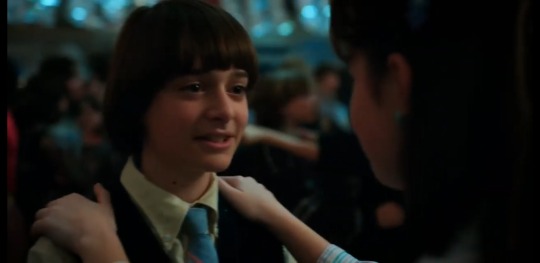
That is not a real smile, that is not a comfortable boy, and that is not an accident; Noah Schnapp is one of the best actors in the entire show, and of the young boys, he is the one the Duffers trust most to do dramatic heavy lifting.
Do you want it to be a little more explicit? Okay, here is that scene in the script:
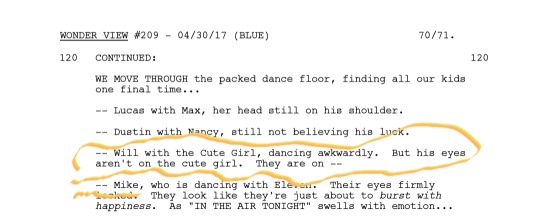
I mean, that pretty much speaks for itself. It's less explicit in the actual show, but it's still there, you know?
Season 3
And now, the biggest and most explicit thing to date; The Scene. I mean, you could discuss the obvious subtext in the simple fact that Will is the only male main character who has yet to find a girlfriend or express any interest in girls whatsoever, but that pales in comparison to The Scene.
The setup for The Scene is pretty simple; after declaring "a day free of girls" in order to get his friends to run the D&D campaign he's probably spent a significant amount of time creating, his friends have blown him off to continue bemoaning their girl troubles, so Will has decided to leave. Mike, realizing too late that he has genuinely upset his friend, chases after him to try and get him to come back.
A back-and-forth argument ensues, where Will accuses Mike of ruining the party and abandoning his friends in favor of girls, and Mike, in the heat of the moment, responds with "It's not my fault you don't like girls!" After which, everything stops. There is a full second of silence, and a close up on Noah Schnapp's face so you can take in his reaction.
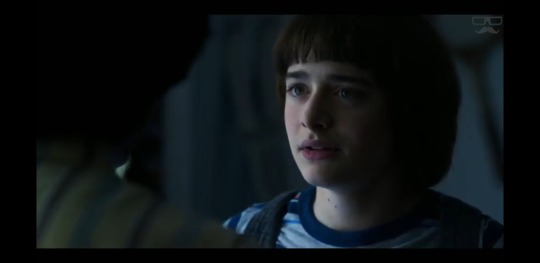
There is a lot to unpack here. Now, acting is up to interpretation to a degree, but to me, that expression conveys two primary emotions; shock, and betrayal. That face says "how could you?" Because here's the thing; regardless of what Mike does or doesn't know about Will's sexuality, Mike knows for a fact that Will has been called a queer all his life by everyone from his school bullies to his own fucking dirtbag father. By invoking even the specter of that, Mike has crossed a fucking line, and he knows it. And we know he knows it, because he immediately backtracks and tries to mitigate the damage. But it's too late. The damage has been done.
I also think there is a tinge of fear in that image. Just a moment of soul raking panic that pretty much every closeted queer person knows intimately. It's very brief. But I think it's there, if you look.
This scene sends Will into an emotional tailspin that culminates in him tearing down the literal last bastion of his childhood in a fit of sorrow and rage. His innocence has been destroyed. He cannot regain what he has lost, and he can never go back to the way things were before. This is the emotional climax of his arc for season three. It's a powerful one-- shame it comes in the third of eight episodes, but that's neither here nor there.
And that's pretty much it for now. Any one of these things taken in isolation could be very easily dismissed, but here's the thing; they aren't isolated incidents. They are part of a clear and consistent pattern, one that goes all the way back to the show's inception, before even one minute of footage was filmed. And this pattern points to one very obvious conclusion; the Duffer Brothers have always intended, and continue to intend, for Will Byers to be gay.
Now, for the obvious question; why haven't they made it explicit yet?
The answer is as unfortunate as it is obvious; I don't know.
It's entirely possible that there is some external force that the Duffers have to answer to that is preventing them from actively pursuing this particular storyline. This happens all the time in Hollywood, and it could be anything from Netflix to Noah Schnapp's parents to Noah Schnapp himself just being uncomfortable with it. Many are the creators who dream Big Gay Dreams only to run into the horrors of our Forced Hetero Reality. If the Duffers ultimately submit to these pressures, I hope you won't be too hard on them. This shit is harder than you think to get to the screen sometimes.
But it's also possible that they just aren't ready for it yet. That they have been saving this for a future storyline, that they just want their characters (and the actors) to get a little older before they pursue this particular storyline explicitly, but they've been busily laying groundwork for it so that anyone paying attention will know it's coming.
I don't know. Only time will tell for sure.
For now, I can tell you this; I see a great deal of evidence that the Duffers still intend for Will to be gay, and precisely zero that they have changed their minds.
I hope that holds true.
232 notes
·
View notes
Note
I was surprised that you didn't mention Viggo in your mental illness analysis. I've always thought that he seemed like a high functioning psychopath, perhaps an example of the Dark Triad (psychopathy, Machiavellianism and narcissism). He is ruthlessly cruel to dragons, infects people for profit without remorse, and has a henchman executed in his first appearance. He also seems to have lacked genuine affection for his own brother. Like Dagur, I found his redemption unrealistic.
From this post.
The post prompt did ask specifically for dragon riders, which is one reason I wasn’t putting Viggo on the radar, but I suppose I also interpret Viggo’s personality from a different angle than you do. While it is true that Viggo can be cruel to dragons (though not out of the norm for Barbaric Archipelago society!), can be very self-confident, and is interested in his profits, I also find Viggo to be someone who operates under a sense of gray morality rather than a psychologically diagnosable, consistent disregard to others. He especially isn’t someone I find who acts with something like Narcissistic Personality Disorder (NPD) - it takes more than being greedy and putting oneself first to have NPD. There are so many neurotypical human beings in this world who act with both greed and disregard to certain populations (like non-human animals), and Viggo is someone I think who manifests a drive for profits - but not someone who has an excessively inflated sense of self-importance or an inhibition to comprehending others’ emotions.
I find Viggo a neurotypical individual, as with most of the villains in the How to Train Your Dragon franchise - Alvin the Treacherous is also someone who does horrible things without care to other individuals, Krogan has far less interest in other human lives, but that sort of treatment of other humans comes from many avenues, not per say personality disorders. What experiences we have in life and how we respond to them shape how callous or kind we are to people, and that’s what happens with Viggo. I mean, even siblings loathing each other is something that happens with far more frequency than the psychological conditions detailed in the DSM.
And in truth, beyond a discussion of mental ailments, I also don’t think that calling Viggo extremely callous and lacking remorse is a full picture of what his personality is. I see Viggo as a character who is willing to go into more “gray” zones than others with conscience do, but he’s also someone who doesn’t give up his conscience entirely. He even admits that as a kid he was someone who thought a lot more along idealistic virtues. So he’ll do brutal acts, yes, but needlessly brutal? Not as much. And the more time Viggo spends with Hiccup… the more we see instances of mercy.His very introduction sets the stage as someone who sees a gray zone of morals (rather than no conscience) and is willing to learn the techniques to win from anywhere he can. It’s through this sense of conscience, and this sense of learning techniques from whomever he can… that he comes to respect Hiccup. I think that his redemption was written in a realistic, gradual-growing manner.
Viggo’s redemption arc grows in two main fronts: his disenfranchisement with Krogan, and his growing respect of Hiccup.
Setting the Stage: Viggo and Ethics
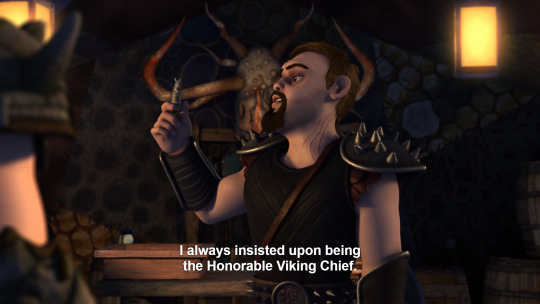
In Viggo’s character introduction, we see how Viggo talks about the blur between society’s typical assessment of good and evil. He furthermore mentions something interesting - when he was a child, he wanted to be the “honorable Viking” himself.
Viggo: Maces and Talons. I began playing with my grandfather when I was just a boy. I always insisted upon being the honorable Viking chief. I could never understand how he bested me time and time again. For years I assumed his skill transcended mine.
When we are young, we’re often more idealistic, be it anything from dreaming how far we’ll succeed in life, to believing how people will (or should) act in difficult situations. Society can have a sense of an ideal “good” morality framework that makes you act like the honorable Viking in every circumstance, doing nothing that would be even the slightest bit morally gray. We learn that Viggo had that sense of conscience and idealistic good in him as a boy, a desire to be that honorable and morally upright being who never stepped into questionable mud.
But what Viggo learns in life - and which many of us do, honestly - is that moral choice isn’t so easily black and white. What actually is the right choice is more convoluted in context, circumstances, means, ends, goals, values, starting states, ending states… so many factors… that it’s sometimes legitimately hard to weigh all the pros and cons and make what you believe to be morally best. Do you do something some people would consider “sketchy” to reach the great, moral end goal? Or do you avoid getting that great moral salvation moment at the end because you cannot tolerate doing something “sketchy” at the start? Or do you just play it by whatever your conscience feels at the time? Deontology, teleology and utilitarian-type ethics, virtue theory… there’s a reason why philosophers have posited so many different frameworks by which to evaluate moral theory and to try to arrive at an understanding of what morality is. It’s because it’s tricky as fuck in the real world.
The way I see Viggo’s comment, he started with a pretty idealistic deontological framework as a boy. He believed that he could always do the right thing and that the means would always be just as pure as his ends. Deontology in moral philosophy is the belief that actions in and of themselves are good and bad, and that you can’t use any action to reach a greater goal at the end (the ends do not justify the means, essentially). But Viggo found out, through Maces and Talons, through the trials in life, that this maybe wasn’t the best way to approach life’s challenges. And indeed he continues on to say:
Viggo: But you see, in Maces and Talons, as in life, the line between good and evil is often unclear. Black and white can become gray so easily. What one soul considers evil another might consider righteous. The honorable chief who fails to see this is found to be the fool.
Viggo isn’t saying that any action is permissible. What he’s saying is that he’s moved from a deontology-based ethical framework to something more utilitarian. That is, he thinks the ends can justify the means. Sometimes you have to do something that might raise a few eyebrows in order to reach that better end result. That’s what he’s saying about “What one soul considers evil another might consider righteous.” Someone who is a deontologist would frown at a utilitarian individual’s course of actions, but both people legitimately believe they are doing the morally upright choice.
Now, I’m not saying that Viggo believes he’s always in the moral good. I don’t think he does. He knows he’s made moral mistakes and has crossed the line. But I also don’t think he’s saying, “Meh. All actions are okay. Nothing is evil!” Viggo is just saying that you’re naive if you’re going to try to act life as a deontologist. And that is indeed how we see him act throughout Race to the Edge. He’s not going to do something “sketchy” without remorse and reason, but he’s also going to take a few steps down the “gray path” that the strict deontologist wouldn’t.
This setting the stage is important to understanding Viggo’s character as he comes in contact with Hiccup. Hiccup is someone who still holds the ideals Viggo has discarded as unsatisfactory and incomplete. It’s one reason why Viggo might think Hiccup isn’t a threat at first. But as you watch Viggo develop, you realize… Hiccup’s ideals being the “honorable Viking chief” are going to hark to Viggo’s internal interests, too. And as Hiccup still manages to get things done without being played for a fool… Viggo’s respect in him will grow.
Viggo’s “Mercy”
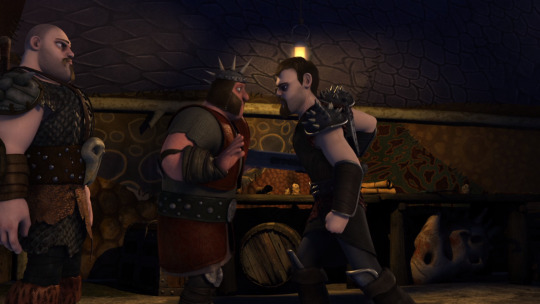
Viggo has a sense of mercy for the people around him, too. It’s not readily available in his opening introduction - that’s a rather ominous and worrisome moment. However, it sets the stage for how he continues developing. We know Viggo is someone who once believed in being the “honorable Viking chief” - and now his introductory scene shows how he has removed himself from what he believes is a naive perspective.
When Viggo learns about the hunter who takes inventory without permission, he first holds a sword in front of the man. Many other villains in the HTTYD franchise would have been crueler to this man. But Viggo, instead, after terrifying the man by holding a sword to him, puts the sword away. He doesn’t punish the man, lets the man go away, and says, “We’re not animals.” His first appearance isn’t executing a henchman; it’s granting the henchman a second chance. The man, as he leaves Viggo’s tent, breathes out, “Oh, thank you, Viggo. Thank you.” Viggo is a harsh boss who is willing to do some scare tactics to get people to pay attention to him, but he isn’t going to kill someone for a minor infraction like that.
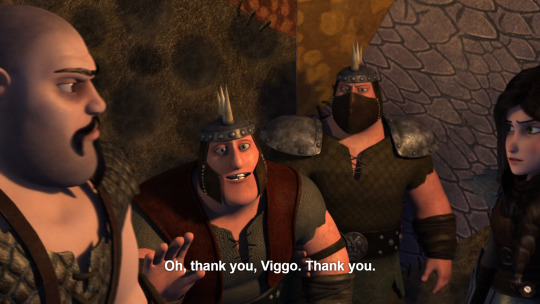
In fact, Heather, who’s used to seeing lots of barbaric people in the archipelago, is surprised to see Viggo’s mercy. He’s acting a lot kinder than many of the villains she’s come across before - including her brother.
Heather: You forgave that man. I wasn’t expecting that.Viggo: Forgiveness. Not exactly a sound business practice, now, is it?
Now, this isn’t the full story. You’re right. If you’ve been reading this far and are raising your eyebrows, that’s because you know we’re not done. This scene’s not as cute and clean as that. We hear the man screaming after he’s taken away. Clearly the man who thought he was forgiven wasn’t brought out free - he was punished. Clearly Viggo isn’t as forgiving as his first action makes him appear.
I personally am not convinced the man necessarily died. Maybe he did, maybe he didn’t, but since it’s a long, sustained scream that we hear in the distance… the man is likely to have survived. The man would have been suddenly punished, given how he was deceived, but a quick execution would have created a cut-off scream. Regardless, the end result of Viggo’s conversation with Heather isn’t the nice-sweet-mercy-thing we originally thought. He’s giving her an ominous threat about what could happen to her if she ends up being a traitor. She could get taken out before she even realizes that she’s being punished.
The reason I’m bringing this up is because it still sets the stage for Viggo’s perspective and growth throughout the show. Viggo might have punished this man in a creepy way - be it death or something less - but the concept of “We’re not animals” actually, interestingly enough, remains. Viggo is willing to do some dark, manipulative things - like trick this man into thinking he’s punishment-free, then enacting the punishment - and through it intimidating Heather - but he’s also someone who pays attention to the gray zone of morality… and we see that the more we interact with him.
Growing Tensions between Hunters and Riders
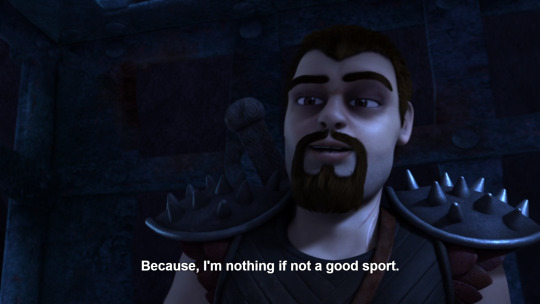
Hiccup starts as a toy to laugh at. But as the two interact increasingly more, Viggo finds that Hiccup should not be underestimated. This is the growth that happens between these two from Seasons 2-4.
So. For starters: Viggo doesn’t kill people when he doesn’t need to. He toys with Hiccup when they first meet, but he doesn’t kill the teen - even when he has the chance. This is true even in “Maces and Talons Part 2″ before Hiccup influences Viggo. We see from the start Viggo has the internal capacity to grant mercy.
At this point, Viggo finds Hiccup more of an amusing nuisance than anything else - not a threat to be extinguished. Viggo even thinks that Hiccup’s reputation plays the young man up more than he actually is. So, at this point, Viggo believes he doesn’t need to kill Hiccup - Hiccup hasn’t done anything to “merit” that. It’s enough for Viggo to show Hiccup that he’s more manipulative and powerful than the boy, and through that, hopefully dissuade the young dragon rider from interfering with his business dealings. Viggo manipulates, without killing, to toss Hiccup off his back before the boy can do any more mucking around with the dragon hunters.
Of course, Hiccup doesn’t get dissuaded. Hiccup decides to continue tackling on and disrupting dragon hunting trade. The kid Viggo initially considers to be an amusing non-problem turns into a real problem. Viggo becomes frustrated - the kid is interfering with his business! (His legitimate business, might I add. Everyone in the Barbaric Archipelago was hunting, fighting, or using dragons for trade goods. Viggo doesn’t necessarily beat dragons cruelly - he’s using them as wares like everyone else at the time). And so Viggo transitions from disregarding Hiccup to finding him an actual, annoying, frustrating pest.
Now Viggo needs to deal with Hiccup.

At first, Viggo thinks that he can deal with Hiccup and his increasingly meddlesome behavior by manipulating Hiccup - hence his “Defenders of the Wing” manipulation tactic. Hiccup can still be of use as he is. The kid’s fervor for protecting dragons can be used. But by Season 4 times, Hiccup has aggravated and tarnished enough of Viggo’s plans that he really needs to do something about Hiccup, and he’s going to use increased measures, precautions, and dangerous tactics to do so.
Viggo and Hiccup constantly raise the stakes and circumstances for each other. They continue seeing the capabilities each has. By this point, Viggo no longer underestimates Hiccup, but considers him quite the adversary. Just consider the change in perspective Viggo’s had toward Hiccup from S2 “Maces and Talons Part 2″ versus S4 “Gold Rush”:
“Maces and Talons Part 2″ - Viggo is not worried about being exposed to Hiccup alone, thinks that Hiccup and Toothless were no problem or danger at all to him, and leaves them alone without any consequence once he has the Dragon Eye he needs.

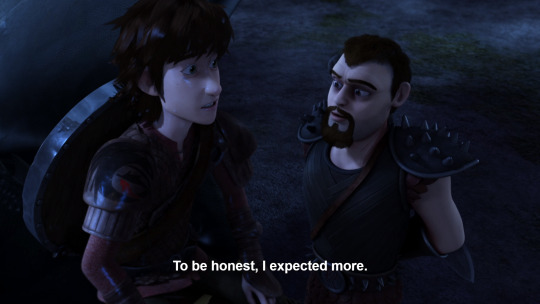
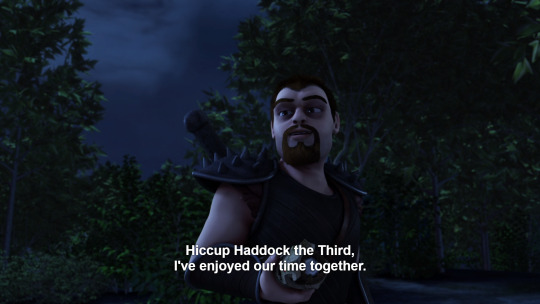
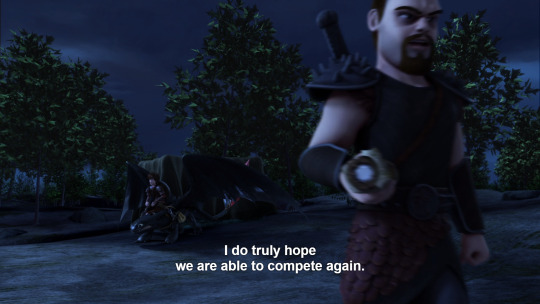
“Gold Rush” - Viggo mentions having extra precautions about being around Hiccup and the riders, and in fact is planning to kill them and their dragons because they’ve been such a threat to his operations. He goes out of his way to make sure the residents of Dragon’s Edge are eradicated.
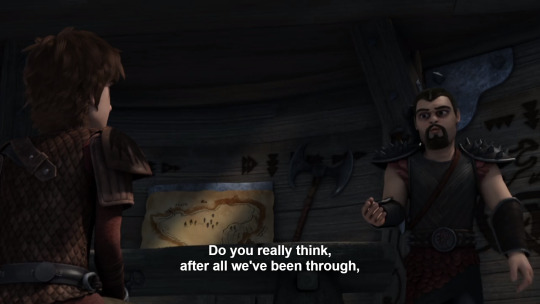



It’s a growing rivalry with a morphing perspective on Viggo’s end.
And by the end of it, Hiccup outsmarts Viggo… and Viggo falls to his near-death.
Viggo, despite having his added gray morality choices (compared to Hiccup’s limited “honorable Viking” ideology), is overcome.
Viggo’s Mercy
Viggo has learned to see Hiccup as someone to not be underestimated. Viggo has seen Hiccup’s inventiveness and abilities to get the task accomplished. As someone like Viggo who takes tactics where he can, it makes sense that his frustration of Hiccup… turns into begrudging respect of Hiccup. He can respect someone clever wherever he finds them.
We see Viggo starting to take some of Hiccup’s ideas to level the playing field. Viggo starts using the cauldron to withstand the fires of the volcano - the same tactic Hiccup and the Defenders of the Wing used to survive lava. This makes sense. Viggo is a tactical man who knows when an idea is smart.
But because Viggo is learning to begrudgingly respect Hiccup… he’s actually being influenced by Hiccup in more ways than how to survive lava encounters. He’s also got some respect for Hiccup’s ideological framework - that ideological framework that Viggo himself once held true as a child.
And this is where we really start to see that Viggo does have a sense of mercy and compassion for other individuals.
Krogan is introduced in a way somewhat akin to Viggo. Krogan at first seems to offer mercy to a dragon hunter who doesn’t like how they hunt, asking for feedback and offering to let the employee leave. But then Krogan murders the man and asks the others if they’re willing to question his tactics, too. Just like Viggo, Krogan offers false mercy and trust, then shows who’s really in charge. But unlike Viggo, Krogan never demonstrates a respect for smart, tactical behavior, nor a respect for the value of a human life.
Krogan is someone who’s more willing to be ruthless with his punishments or disregard others. In this season the two butt heads a lot about not only how to run their operation… but also about moral values. Viggo is the one who tells Krogan they need Fishlegs alive because the boy has extensive dragon knowledge; Krogan is the one who says he has enough knowledge himself and they might as well kill Fishlegs. Viggo is the one who says that reverence isn’t a bad thing so long as it doesn’t cloud one’s judgment, and uses Hiccup’s ingenuity and victories against Viggo as inspiration for future projects; Krogan is the one who just looks down on Hiccup and thinks he shouldn’t be given such respect. When Krogan says that Hiccup’s weakness is being afraid to shoot to kill, Viggo actually seems… irritated at the suggestion.

And, most tellingly, when Krogan is willing to let men die going down into the lava… Viggo is trying to minimize casualties:
Krogan: Why are you sending only one man down at a time?Viggo: I sent three down last time. Only one came back, which is two more than the time before that.Krogan: They’re disposable. That’s why we have so many of them.Soldier: That’s right. Krogan doesn’t tolerate failure.Krogan: Right you are. Now, say your farewells and get your pathetic behind back in that tub. Now!
Krogan doesn’t care if these men die. The fact that Viggo actually is trying to keep his subordinates from dying says something, doesn’t it? In a subtle way, Viggo’s enacting mercy.
Throughout Season 5, we see that Viggo is definitely the more thoughtful and considerate individual between the two.
Some of it is harking back to who he always has been - again, he didn’t kill Hiccup needlessly in “Maces and Talons” or anything. Some of it is that Krogan’s rudeness is making Viggo hate their alliance and disrespect his partner in crime. And some of it is also harking back to Viggo learning to respect Hiccup for who he is, tactics and morals and all.
Viggo’s Redemption
Frankly, the more we see Krogan be rude to Viggo, the more we see Viggo preferring Hiccup over him. But because Viggo and Krogan have the same goal, while Hiccup has an opposing goal, it’s pragmatic and obvious for Viggo to continue with his current partnership.
Until, of course, that partnership ends. Krogan forsakes Viggo. Krogan, like always, has no regard for anyone else. Krogan, like always, holds no respect for Viggo’s motivations and ideas. Krogan, through these actions, butts Viggo out of the game and nearly has him killed.
So for someone who’s grown to respect Hiccup Haddock and grown increasingly disillusioned with his partner Krogan… and for someone who still has some goals he needs to accomplish with extra assistance… it makes sense that Viggo is going to go to a new partner.
Viggo does this in a realistic way that isn’t sudden repentance saying he’s wrong. Viggo is still manipulative, trying to trick Hiccup, talking up things like the red oleander flower. Viggo is still wanting to partner with Hiccup for his personal ends, not for bettering Hiccup’s stock or because he sees eye-to-eye with Hiccup’s desires. But Viggo’s working with Hiccup out of a set of conditions that makes complete sense from context.
Viggo is never someone who returns back to idealism and what he considers a naive frame of ethics. When he recruits Hiccup for help in Season 6, he even tells Hiccup that the kid isn’t ruthless enough, and that this is going to come back to bite him. Viggo has learned through life that the person who seems to have greater skill is probably the person who isn’t limiting themselves from achieving their needed (and often good) end. But because of how situations fall down between Viggo and Hiccup, he makes that last-minute redemption built out of the respect that’s been ever-growing out of him for the dragon riding crew.

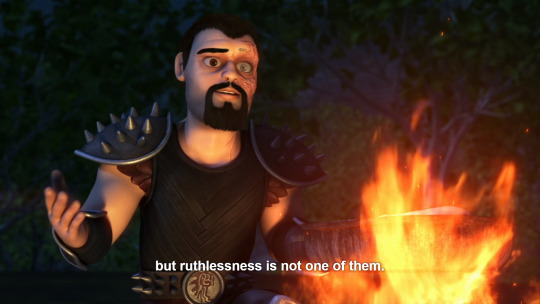

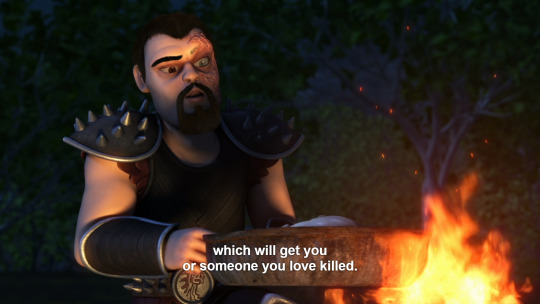
At the very end, when Viggo is about to die… he’s going to respect the boy who he sees deserving of respect, over dying for the cause of Krogan, who’s betrayed him.
And maybe, in that part of Viggo that’s still a child, he’s happy to be fighting for the “honorable Viking chief” - even if he, the traitor, dies in the end.
So for Viggo’s characterization arc? Personally, for me, it works.
Unlike Dagur, I think that Viggo’s arc was much better paced and gradually built, with a good progression of events that allow us to understand why Viggo would eventually take Hiccup’s side. He’s not someone with a psychological inability to feel compassion for others. He’s not someone so self-important that he can’t respect and learn from people who best him. He’s not someone unusual to society - he’s someone who is focused on profits and puts others’ interests a little bit aside for his own gain. He’s not someone who is morally credible in every choice, but he’s also got some good points to make about how we might or might not achieve our goals. Frankly, I agree with Viggo on more points than I should probably admit. But regardless, this is why I appreciate his character arc, and why I feel he was a well-constructed character start to end in the RTTE narrative.
#long post#rtte#Race to the Edge#Maces and Talons#Maces and Talons Part 1#Maces and Talons Part 2#Gold Rush#Triple Cross#The Wings of War#The Wings of War Part 1#Viggo#Viggo Grimborn#analysis#my analysis#ask#ask me#anonymous#awesome anonymous friend#Krogan
114 notes
·
View notes